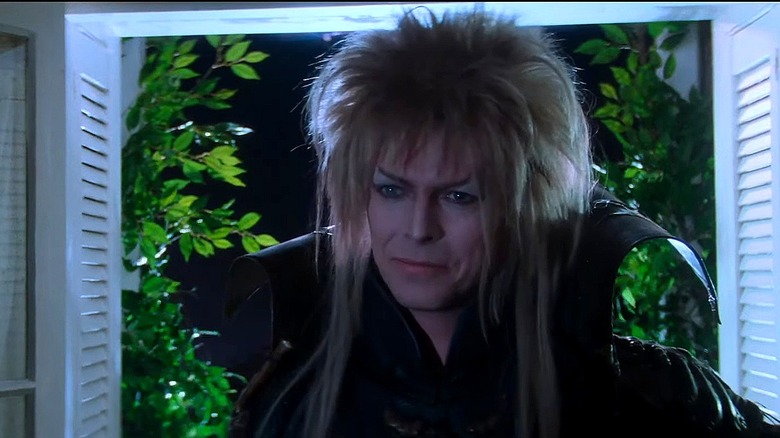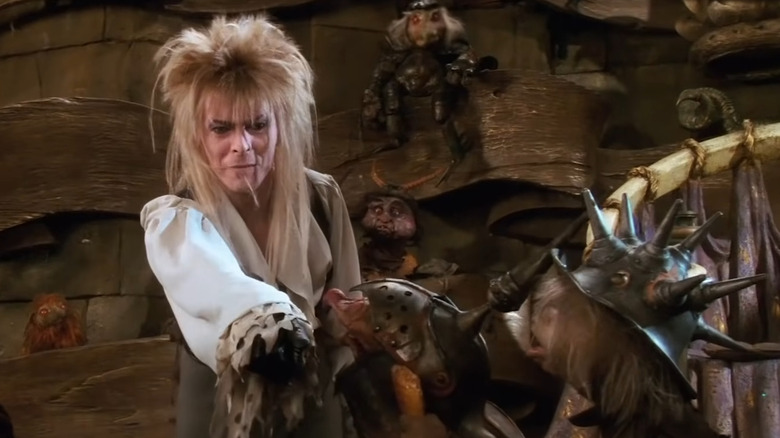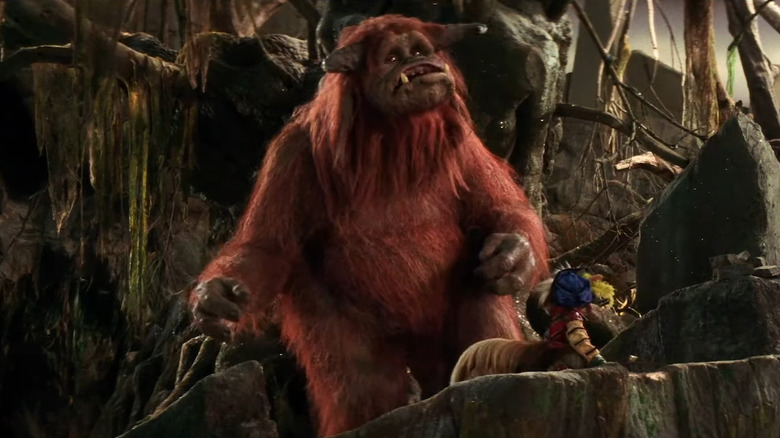Why Jim Henson Rejected Labyrinth's Initial Script - And Then Came Back To It
Jennifer Connelly wasn't the only who had to work through a maze in "Labyrinth." Before becoming the cult classic we know it as today, the film's screenplay went through a journey of its own.
Following the 1982 puppet-starring fantasy "The Dark Crystal," Jim Henson collaborated once again with artist Brian Froud to develop a new fantasy film, only this time audiences would see humans share the screen with Henson's puppets. It was up to Canadian children's writer and poet Dennis Lee to flesh out the idea as a story, using Froud's drawings as a basis. From there, Monty Python comedy troupe member Terry Jones was brought in to write the screenplay. What Jones received from Lee was rather surprising, telling Empire, "Rather than write a script, he'd written a poetic novella ... but I didn't really get on with it, so I discarded it and sat down with Brian's drawings ... and started creating the story from them."
Jones' first draft failed to capture the coming-of-age story Henson was hoping for while also not featuring Jareth (David Bowie) enough. Following some more rewrites, however, the Muppet creator had a change of heart. "Jim said to me, 'Er, well, I think we've messed it up. It's not funny now – can you do something with it?'" Jones tells Empire. The script continued getting refined until 1985 when production began. Little would anyone know, however, that this was only the start of the film's long journey to becoming a beloved fantasy classic.
The Hensons believe that the film's odd tone led to its box office failure
For many today, "Labyrinth" remains a rewatchable childhood staple. Whether you connect with its coming-of-age narrative about overcoming great odds, are dazzled by its stellar puppetry, or simply can't get enough of David Bowie and his endless array of catchy tunes, there's an undeniable charm oozing from the film that can't quite be compared. However, when first released, that unique identity may have been the film's undoing. On a $25 million budget, "Labyrinth" only managed to snag a measly $12 million at the US box office. This, combined with its middling critical response, brought great disappointment to Jim Henson at the time.
Speaking with Collider, Jim's son, Brian Henson, hypothesizes that audiences during this period simply weren't ready for the fantasy film's eclectic mix of concepts and tones. "The fact that the film was not received well when it was first made is really because it was so different," Henson comments. "It wasn't 'The Dark Crystal' and it wasn't 'The Muppets,' and it was kind of 'Dark Crystal'-ish, but then it was comedy and it was David Bowie, and I think people just didn't really understand it." Over time, thanks to the film's success on home video, people did learn to understand and love the film for all its oddball eccentricities.
The quirky nature of "Labyrinth" has undeniably stood the test of time. But could a potential followup breath new life to the cult gem?
Could a Labyrinth sequel take on a darker tone?
The creatives who helmed the story of "Labyrinth" may have went with a more kid-friendly tone for the final product, but is there a chance that a "Labyrinth" sequel could dive deeper into the film's dark side? A followup to the 1986 film was announced in 2016 with Lisa Henson attached as producer while "Guardians of the Galaxy" co-writer Nicole Perlman was to helm the screenplay. The production has moved steadily since, with "Doctor Strange" and "The Black Phone" director Scott Derrickson being attached while star Jennifer Connelly has had discussions about the project.
It may be worth revisiting some of the potentially heavier ideas proposed in Terry Jones' first draft. "Labyrinth" really was David Bowie's movie and with the great entertainer's death in 2016, the idea of trying to replicate that level of charisma by anyone else would just not feel right. Given that Jones' original version had the Goblin King figure hidden until the end of the film, this could allow the sequel to have a greater sense of mystery while also allowing more room to explore a nightmarish tone. The Henson team captured this spirit with the 2019 Netflix prequel series "The Dark Crystal: Age of Resistance," which managed to maintain the unnerving feel of its cinematic predecessor. Giving a "Labyrinth" sequel a creepier tone would let fans see what Jones' original idea may have been like and in turn would give the sequel its own rich identity.


